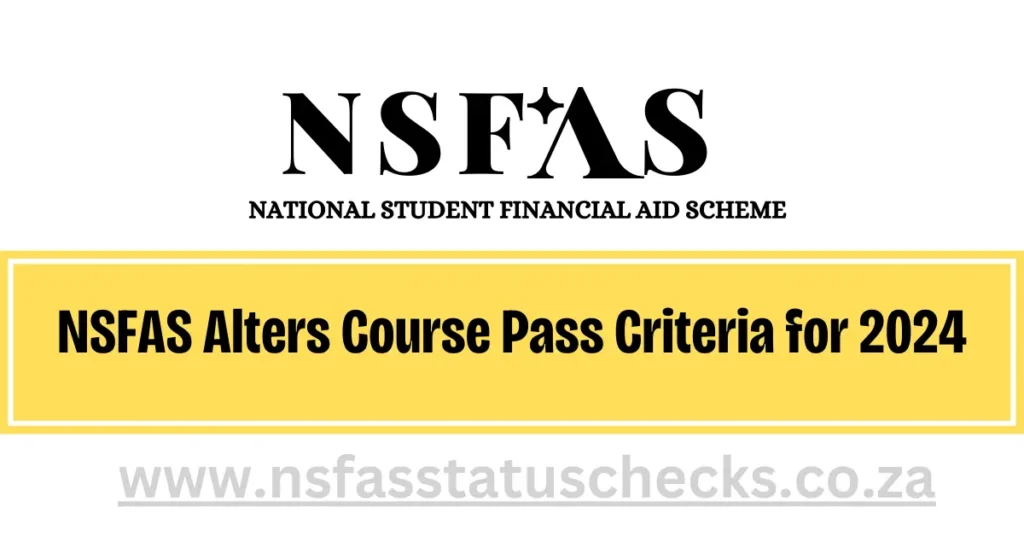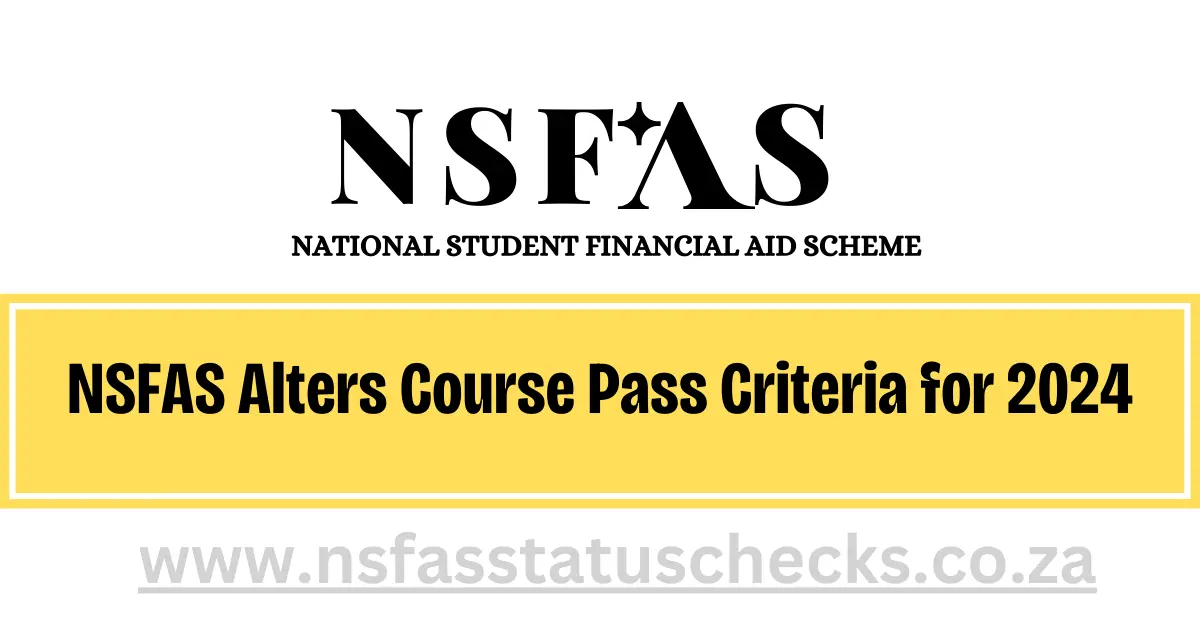The National Student Financial Aid Scheme (NSFAS) has recently announced significant changes to its course pass criteria for 2024. These changes are expected to impact thousands of students across South Africa. In this article, we will explore in details about NSFAS Alters Course Pass Criteria for 2024. We will also discuss the criticisms and support the changes have received, as well as provide guidance on how students can adapt to the new pass criteria.

NSFAS Alters Course Pass Criteria
NSFAS, a crucial financial aid scheme supporting underprivileged students, has revised its course pass criteria for 2024. The changes are part of NSFAS’s ongoing efforts to improve student success rates and ensure that financial aid recipients make satisfactory academic progress.
Explanation of Changes
Under the new criteria, students must achieve a minimum pass mark of 50% in all courses to qualify for NSFAS funding. Additionally, students are required to pass at least 75% of their registered courses each semester to maintain eligibility. The suspension or cancellation of funding could occur if these criteria are not met.
Reasons for Changes
NSFAS has stated that the changes are necessary to ensure that students are making adequate progress towards their qualifications and to address concerns about high drop-out rates among financial aid recipients. By raising the pass criteria, NSFAS aims to improve graduation rates and the overall quality of education in South Africa.
Changes in Course Pass Criteria for 2024
Previous criteria
In the past, the course pass criteria were based on a certain percentage mark that students needed to achieve to pass a course. This system has been in place for several years and has been the standard for measuring academic performance.
Reasons for Altering the Course Pass Criteria
NSFAS has decided to alter the course pass criteria for 2024 to address concerns about high dropout rates and low graduation rates among students receiving financial aid. The new criteria aim to provide students with additional support to help them succeed academically.
New criteria
However, for 2024, NSFAS has decided to implement a new set of criteria. Instead of just focusing on the percentage mark, the new criteria will also take into account other factors such as class attendance, participation, and completion of assignments. This holistic approach is aimed at providing a more comprehensive assessment of student performance.
Impact on Students and Educational Institutions
These changes are expected to have a profound impact on students, particularly those who struggle academically or face challenges that affect their performance. Educational institutions are also likely to feel the effects, as they may need to provide additional support to help students meet the new pass criteria.
Impact on Students
The altered course pass criteria are expected to have a significant impact on students, particularly those who are currently receiving NSFAS funding. For students, NSFAS funding issues continue to pose a challenge. Under the new criteria, students will be required to maintain a higher academic performance to continue receiving financial aid.
Impact on Higher Education
The changes in NSFAS course pass criteria are expected to have a positive impact on higher education by ensuring that financial aid is allocated to students who are academically deserving and committed to their studies.
Criticisms and Concerns
While the changes are intended to be beneficial, they have been met with criticism from some quarters. Many critics argue that the new pass criteria could disproportionately impact disadvantaged students who already face numerous challenges as they progress through their academic careers.
Support and Positive Reactions
On the other hand, many stakeholders have expressed support for the changes, believing that they will motivate students to perform better academically and increase the value of NSFAS funding. Some educational institutions have also welcomed the changes, seeing them as a step towards improving educational outcomes.
Adapting to the Changes
To adapt to the new pass criteria, students are encouraged to seek academic support services offered by their institutions, such as tutoring and study skills workshops. It is also important that they communicate with their lecturers and advisors so that any challenges can be addressed. In addition, you can also check out the app’s tutorial for withdrawing with NSFAS Mastercard.
Suggestions for Educational Institutions
Educational institutions can support students by providing additional academic support services, monitoring student progress more closely, and implementing strategies to improve student retention and success rates.
Conclusion
The changes in course pass criteria for 2024 announced by NSFAS are significant and will have both positive and negative impacts on students. It is important for students to understand these changes and take proactive steps to prepare for them. By adopting effective study strategies and time management skills, students can navigate these changes successfully and achieve their academic goals.
NSFAS Alters Course Pass Criteria – FAQs
What are the changes in NSFAS course pass criteria for 2024?
The changes in NSFAS course pass criteria for 2024 require students to maintain a higher academic performance to continue receiving financial aid.
How do these changes affect students currently receiving NSFAS funding?
Students currently receiving NSFAS funding will need to meet the new course pass criteria to continue receiving financial aid.
Are there any new eligibility criteria introduced by NSFAS for 2024?
Yes, NSFAS has introduced new eligibility criteria for 2024, including a minimum academic performance requirement and the submission of additional documentation.
How will these changes impact access to higher education for disadvantaged students?
These changes are expected to have a positive impact on access to higher education for disadvantaged students by ensuring that financial aid is allocated to those who are academically deserving and committed to their studies.
